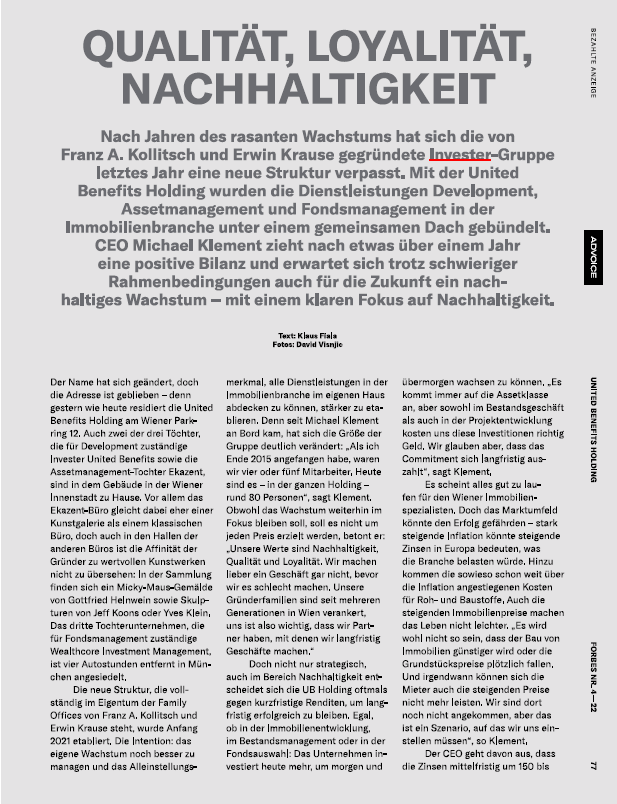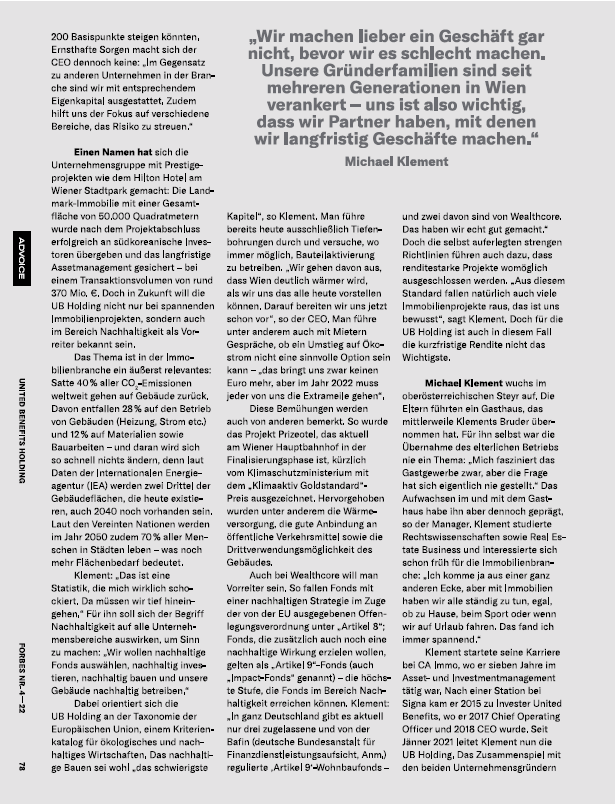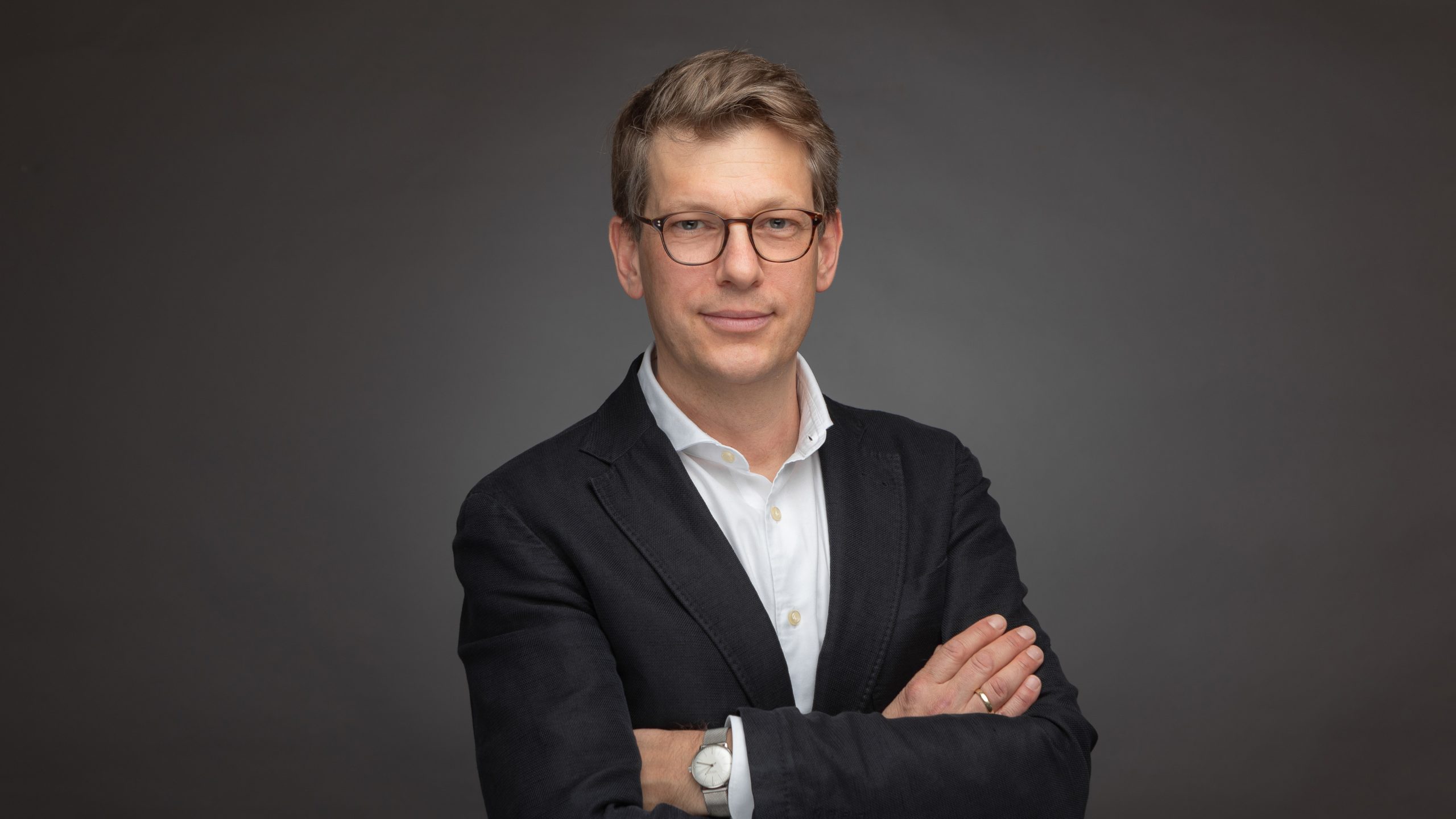CEO of our parent company United Benefits Holding, Michael Klement, in an interview with Forbes Austria.
After years of rapid growth, the Invester Group founded by Franz A. Kollitsch and Erwin Krause gave itself a new structure last year. With United Benefits Holding, the services of development, asset management and fund management in the real estate sector were bundled under one roof. CEO Michael Klement takes positive stock after a little more than a year and expects sustainable growth in the future - with a clear focus on sustainability - despite difficult general conditions.
The name has changed, but the address has remained the same - because yesterday, as today, United Benefits Holding resides at Parkring 12 in Vienna. Two of the three subsidiaries, Invester United Benefits, which is responsible for development, and the asset management subsidiary Ekazent, are also at home in the building in the centre of Vienna. The Ekazent office in particular looks more like an art gallery than a classic office, but the founders' affinity for valuable works of art is also evident in the halls of the other offices: The collection includes a Mickey Mouse painting by Gottfried Helnwein as well as sculptures by Jeff Koons or Yves Klein. The third subsidiary, Wealthcore Investment Management, which is responsible for fund management, is located four hours away by car in Munich.
The new structure, which is fully owned by the family offices of Franz A. Kollitsch and Erwin Krause, was established at the beginning of 2021. The intention: to manage its own growth even better and to more strongly establish the unique selling point of being able to cover all services in the real estate industry in-house. Because since Michael Klement came on board, the size of the group has changed significantly: "When I started at the end of 2015, we were four or five employees. Today - across the holding company - there are around 80 people," says Klement. Although growth is to remain the focus, it is not to be achieved at any price, he emphasises: "Our values are sustainability, quality and loyalty. We prefer not to do a business at all before we do it badly. Our founding families have been anchored in Vienna for several generations, so it is important to us that we have partners with whom we do business in the long term."
But not only strategically, also in the area of sustainability, UB Holding often decides against short-term returns in order to remain successful in the long term. Whether in real estate development, portfolio management or fund selection: The company invests more today in order to be able to grow tomorrow and the day after. "It always depends on the asset class, but both in the portfolio business and in project development, these investments cost us real money. But we believe that the commitment pays off in the long run," says Klement.
Everything seems to be going well for the Viennese real estate specialist. But the market environment could jeopardise success - sharply rising inflation could mean rising interest rates in Europe, which would put a strain on the industry. Added to this are the costs for raw materials and building materials, which have already risen far above inflation. Rising property prices are not making life any easier either. "It will probably not be the case that building property will become cheaper or that land prices will suddenly fall. And at some point tenants won't be able to afford the rising prices either. We haven't arrived there yet, but that's a scenario we have to prepare for," says Klement.
The CEO assumes that interest rates could rise by 150 to 200 basis points in the medium term. Nevertheless, the CEO is not seriously worried: "Unlike other companies in the industry, we are equipped with appropriate equity capital. In addition, our focus on different areas helps us to spread the risk."
The group of companies has made a name for itself with prestigious projects such as the Hilton Hotel at Vienna's Stadtpark: the landmark property with a total area of 50,000 square metres was successfully handed over to South Korean investors after the project's completion and the long-term asset management was secured - with a transaction volume of around € 370 million. But in the future, UB Holding wants to be known as a pioneer not only in exciting real estate projects, but also in the area of sustainability.
The topic is an extremely relevant one in the real estate industry: a whopping 40 % of all CO2 emissions worldwide can be traced back to buildings. Of this, 28 % is due to the operation of buildings (heating, electricity, etc.) and 12 % to materials and construction work - and this will not change any time soon, because according to data from the International Energy Agency (IEA), two thirds of the building space that exists today will still be there in 2040. Moreover, according to the United Nations, 70 % of all people will live in cities in 2050 - which means even more demand for space.
Klement: "This is a statistic that really shocks me. We have to dig deep into that." For him, the term sustainability should affect all areas of the company in order to make sense: "We want to select sustainable funds, invest sustainably, build sustainably and operate our buildings sustainably."
In doing so, the
UB Holding on the European Union's taxonomy, a catalogue of criteria for ecological and sustainable business. Sustainable building is probably "the most difficult chapter", says Klement. Already today, he said, only deep drilling is carried out and attempts are made to use component activation wherever possible. "We assume that Vienna will become significantly warmer than we can all imagine today. We are already preparing for this," says the CEO. Among other things, talks are being held with tenants to see if switching to green electricity might not be a sensible option - "it won't bring us any more euros, but in 2022 each of us will have to go the extra mile".
These efforts are also noticed by others. For example, the Prizeotel project, which is currently in the finalisation phase at Vienna Central Station, was recently awarded the "Klimaaktiv Gold Standard" prize by the Ministry of Climate Protection. Among other things, the heat supply, the good connections to public transport and the building's potential for third-party use were highlighted.
Wealthcore also wants to be a pioneer. For example, funds with a sustainable strategy fall under "Article 8" in the course of the disclosure regulation issued by the EU; funds that also want to achieve a sustainable impact are considered "Article 9" funds (also called "impact funds") - the highest level that funds can achieve in the area of sustainability. Klement: "In the whole of Germany, there are currently only three authorised 'Article 9' residential funds regulated by Bafin (German Federal Financial Supervisory Authority, note) - and two of them are from Wealthcore. We've done really well with that." But the self-imposed strict guidelines also mean that high-yield projects may be excluded. "Of course, many real estate projects are excluded from this standard, we are aware of that," says Klement. But for UB Holding, even in this case, the short-term return is not the most important thing.
Michael Klement grew up in Steyr, Upper Austria. His parents ran an inn, which Klement's brother has since taken over. For him, taking over his parents' business was never an issue: "I am fascinated by the hospitality industry, but the question never really arose. Growing up in and with the inn nevertheless shaped him, says the manager. Klement studied law and real estate business and became interested in the real estate industry early on: "I come from a completely different background, but we all deal with real estate all the time, whether at home, in sports or when we go on holiday. I always found that exciting."
Klement started his career at CA Immo, where he spent seven years in asset and investment management. After a stint at Signa, he joined Invester United Benefits in 2015, where he became Chief Operating Officer in 2017 and CEO in 2018. Klement has now headed UB Holding since January 2021. The interaction with the two company founders Krause and Kollitsch has not changed greatly in the new structure, says the CEO - the two are available to Klement as "sparring partners", but are not involved in the operational business. "We have a transparent and regular exchange, sometimes weekly, sometimes twice a day. That works very well," says Klement. The company's focus, which is on A-cities in the German-speaking region throughout the entire portfolio, is not likely to change any time soon. Vienna will also remain the company's "home base", although Klement does not deny that they are also looking elsewhere. "In addition to the DACH region, we are also looking at Poland or the Benelux countries. There are exciting possibilities there."
According to Klement, the dynamic growth in the last 24 months was roughly equally distributed across all areas. This had to do with the entry into the residential segment in development, but also with the strategic move into rental. In the future, this could shift somewhat: "In the future, our growth focus will probably be on Wealthcore and Ekazent, i.e. more in fund and asset management," says Klement.
The CEO is cagey about concrete turnover figures - that is one of the advantages of being owned by family foundations - but says that Wealthcore's assets under management (AuM) are expected to break the €2 billion mark by mid-2023. In terms of transaction volume, the
United Benefits Group has reached around € two billion so far.
When asked about a very personal goal of his work, Klement briefly reflects: "I want to create a product around the topics of sustainability and climate that helps to make stocks climate-friendly. That would be a great lever. But Klement himself cannot yet say where this product would be anchored in the company: "Actually, it would have to be a separate vehicle, but that is one of the many questions we are currently asking ourselves. In any case, Klement is not only thinking intensively at the product level, but also in terms of the company as a whole: "I want to make the group so fit that we are well prepared for a turbulent 18 months, because they will come. But we know that, and that's why we are already starting to take our precautions. Because: Never waste a good crisis.













